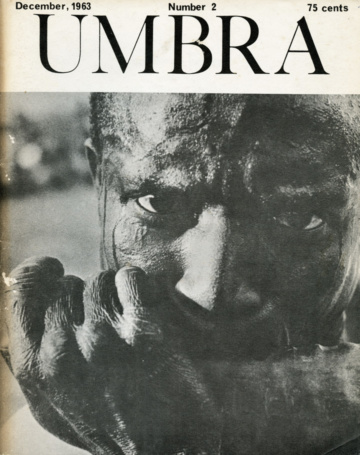Umbra
Thomas C. Dent, Calvin Hernton,
and David Henderson
New York
Vol. 1, nos. 1–5 (Winter 1963–74).
Umbra 2 (1963).

The first literary magazines of the 1960s published exclusively by black writers and for black readers were Soulbook, Black Dialogue, and The Journal of Black Poetry. Umbra (“shadow-region”), which chronologically preceded them, presaged and shared the excitement they generated. Founded by the Society of Umbra, a workshop of musicians, poets, fiction writers, and visual artists, the journal was, unlike the others mentioned above, not a black nationalist literary organ. Aesthetically, however, it was born of the black struggle, as evidenced by this statement in its first issue: “Umbra is not another haphazard ‘little literary’ publication. Umbra has a defined orientation: (1) the experience of being Negro, especially in America; and (2) that quality of human awareness often termed ‘social consciousness.’” The magazine was concerned primarily with issues facing African Americans as these were reflected in creative literature (“poetry, short stories, articles, essays”) and prided itself on its high standards, choosing carefully among a large number of submitted manuscripts. Politically, for Umbra was political, the magazine tended toward the left, “as radical as society demands the truth to be.” Umbra and its cousins Umbra/Blackworks and Blackworks from the Black Galaxy published many of the most important black writers of the sixties and seventies, including Dudley Randall, Ree Dragonette, Conrad Kent Rivers, Lorenzo Thomas, Ann Allen Shockley, Ishmael Reed, LeRoi Jones, Jayne Cortez, Nikki Giovanni, Bob Kaufman, Tom Weatherly, and Jay Wright. The periodical included writers from Africa, the Caribbean, Pasadena, Queens, New York, Illinois, West Africa, and elsewhere.
